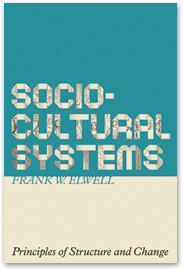
Sociocultural Systems: Principles of Structure and Change Macrosociology: Four Modern Theorists A Commentary on Malthus" 1798 Essay as Social Theory Great Classical Social Theorists In the Classical Tradition: Modern Social Theorists Dr. Elwell's Professional Page
|
Herbert Spencer's Evolutionary Sociology Herbert Spencer [1820-1903] | |
|
Spencer and Contemporary Social Evolution
By Frank W. Elwell
According to historians of social theory, the legacy of Malthus is most
keenly felt in evolutionary theory—social and biological—both directly and
indirectly. Most importantly, Malthus had a profound influence on Herbert
Spencer (1820-1903) in his formulation of social evolutionary theory. While
begun in a series of papers beginning in 1842, this evolutionary theory
became fully explicit in Spencer’s first major work,
Social Statics in 1850: 
"Nature in its infinite complexity is ever growing to a new development. Each
successive result becomes the parent of an additional influence, destined in
some degree to modify all future results….As we turn over the leaves of the
earth’s primeval history—as we
interpret the hieroglyphics in which are recorded the events of the unknown
past, we find this same ever-beginning, never-ceasing change. We see it
alike in the organic and the inorganic—in the decompositions and the
recombinations of matter, and in the constantly-varying forms of animal and
vegetable life….With an altering atmosphere, and a decreasing temperature,
land and sea perpetually bring forth fresh races of insects, plants, and
animals. All things are metamorphosed…
Strange indeed would it be, if, in the midst of this universal mutation, man
alone were constant, unchangeable. But it is not so. He also obeys the law
of indefinite variation. His circumstances are ever changing; and he is ever
adapting himself to them" (Spencer, 1850/1883, 45-46).
Charles Darwin and Alfred Wallace were also influenced by Malthus, both
directly as well as indirectly through Spencer, in their formulation of
biological evolutionary principles. (Yes,
Virginia, again, the influence was from social science to biology; and not
from biology to social science as is commonly believed.)
But Spencer and the biologists turned Malthus on his head and used the
principle of the struggle for survival and reproductive success within a
population to demonstrate the inevitability of improvement of the species
rather than its impossibility. This was accomplished, according to Spencer,
through “adaptation”—those who exhibited more fitness to survive a given
environment inevitably enjoyed greater reproductive success and passed on
these adaptations to their progeny.
"Those to whom this increasing difficulty of getting a living which
excess of fertility entails, does not stimulate improvements
And it is through the gradual improvement of the species that human
societies “progress.”
Progress, therefore, is not an accident, but a necessity. Instead of
civilization being artificial, it is part of nature; all of a piece with the
development of the embryo or the unfolding of a flower. The modifications
mankind have undergone, and are still undergoing, result from a law
underlying the whole organic creation; and provided the human race
continues, and the constitution of things remains the same, those
modifications must end in completeness….So surely must the things we call
evil and immorality disappear; so surely must man become perfect (Spencer
1850/1883, 80).
Modern ecological-evolutionary theory has been stripped of such notions as
the inevitability of “progress” and the perfectibility of man and has again
focused on the Malthusian notion of the interrelationships between
population and production and their effects upon other parts of the
sociocultural system. If any notion of “direction” remains in modern
ecological-evolutionary theory, it is with Spencer’s proposition that
societies evolve toward greater complexity.
Modern ecological-evolutionary theory has also widened its focus on
the environment from Malthus’s more narrow (though fundamental) focus on
agricultural productivity. For a more extensive discussion of Spencer's theories refer to Macro Social Theory by Frank W. Elwell. Also see Sociocultural Systems: Principles of Structure and Change to learn how his insights contribute to a more complete understanding of modern societies.
Bibliography Carneiro, R. 2003. Evolutionism in Cultural Anthropology. Boulder: Westview Press. Darwin, C. 1876/1958. Autobiography. (N. Barlow, Ed.) London: Collins. Elwell, F. 2001. A Commentary on Malthus' 1798 Essay on the Principle of Population as Social Theory. Lewiston: Mellen Press.
Elwell, F. 2006.
Macrosociology: Four Modern Theorists. Boulder:
Paradigm Publishers. Elwell, F. 2009. Macrosociology: The Study of Sociocultural Systems. Lewiston: Mellen Press. Harris, M. 1974. Cows, Pigs, Wars and Witches: The Riddles of Culture. New York: Vintage Books. Harris, M. 1977. Cannibals and Kings: The Origins of Cultures. New York: Vintage Books. Harris, M. 1979. Cultural Materialism: The Struggle for a Science of Culturre. New York: Random House. Harris, M. 1981. America Now: The Anthropology of a Changing Culture. New York: Simon and Schuster. Harris, M. 1985/1998. Good to Eat: Riddles of Food and Culture. Prospect Hights, Illinois: Waveland Press, Inc. Lenski, G. 1966. Power and Privilege: A Theory of Social Stratification. New York: Random House. Lenski, G. 2005. Ecological-Evolutionary Theory: Principles and Applications. Colorado: Paradigm. Lenski, G., Lenski, J., and Nolan, P. 1991. Human Societies: An Introduction to Macrosociology 7th edition. New York: McGraw-Hill Book Company. Malthus, T. 1798. An Essay on the Principle of Population. Public Domain Books. Kindle Edition. 2001. Spencer, H. 1850/1954. Social Statics. New York: D. Appleton. Spencer, H. 1874-1898. The Principles of Sociology. New York: Appleton. Spencer, H. 1876/1967. The Evolution of Society: Selections from Herbert Spencer's Principles of Sociology. (Robert Carneiro, Ed). Chicago: The University of Chicago Press. Spencer, H. 1891.
The Study of Sociology. New York:
Appleton. To reference Spencer &
Contemporary Sociocultural Evolution you should use the following format:
Elwell, Frank W., 2013,
"Spencer & Contemporary Sociocultural Evolution," Retrieved August 31, 2013,
[use actual date]
http://www.faculty.rsu.edu/~felwell/Theorists/Essays/Spencer1.htm
©2005 Frank Elwell, Send comments to felwell at rsu.edu
|
 in
production—that is, to greater mental activity—are on the high road to
extinction; and must ultimately be supplanted by those who the pressure does
so stimulate….And here, indeed, without further illustration, it will be
seen that premature death under all its forms, and from all its causes,
cannot fail to work in the same direction. For those prematurely carried off
must, in the average of cases, be those in whom the power of
self-preservation is the least, it unavoidably follows that those left
behind to continue the race are those in whom the power of self-preservation
is the greatest—are the select of their generation. So that, whether the
dangers to existence be the kind produced by excess of fertility, or of any
other kind, it is clear, that by the ceaseless exercise of the faculties
needed to contend with them, and by the death of all men who fail to contend
with them successfully, there is ensured a constant progress towards a
higher degree of skill, intelligence, and self-regulation—a better
coordination of actions—a more complete life" (
in
production—that is, to greater mental activity—are on the high road to
extinction; and must ultimately be supplanted by those who the pressure does
so stimulate….And here, indeed, without further illustration, it will be
seen that premature death under all its forms, and from all its causes,
cannot fail to work in the same direction. For those prematurely carried off
must, in the average of cases, be those in whom the power of
self-preservation is the least, it unavoidably follows that those left
behind to continue the race are those in whom the power of self-preservation
is the greatest—are the select of their generation. So that, whether the
dangers to existence be the kind produced by excess of fertility, or of any
other kind, it is clear, that by the ceaseless exercise of the faculties
needed to contend with them, and by the death of all men who fail to contend
with them successfully, there is ensured a constant progress towards a
higher degree of skill, intelligence, and self-regulation—a better
coordination of actions—a more complete life" ( on fell out of favor in the social
sciences in the first half of the nineteenth century, being carried forward
in the 1940s through the 1950s almost single-handedly by the work of Leslie
White, later joined by Julian Steward. Then, in 1959, the centennial year of
Darwin’s publication of The Origin of
Species, the interest of social scientists was reawakened and social
evolution again became a wide-spread theory in the social sciences (
on fell out of favor in the social
sciences in the first half of the nineteenth century, being carried forward
in the 1940s through the 1950s almost single-handedly by the work of Leslie
White, later joined by Julian Steward. Then, in 1959, the centennial year of
Darwin’s publication of The Origin of
Species, the interest of social scientists was reawakened and social
evolution again became a wide-spread theory in the social sciences (